The problem of obesity for many people is not only difficult because of body image problems. It is also sometimes dangerous to health and even life. For this reason, more and more people are deciding to undertake a difficult, but necessary to improve the comfort of daily life, and fight for the right weight. Modern medicine allows to make this process much easier.
- What is endoscopic sleeve gastroplasty?
- What results can you get from endoscopic sleeve gastroplasty?
- How to prepare yourself for endoscopic sleeve gastroplasty?
- What can you eat after an endoscopic sleeve gastroplasty?
- What side effects can you expect after the procedure and how to prevent them?
How to deal with obesity using the possibilities of modern medicine? How to prepare yourself for endoscopic sleeve gastroplasty? Let’s try to learn more about this topic.
What is endoscopic sleeve gastroplasty?
Contents
Manga gastrica endoscopica, or endoscopic sleeve gastroplasty, is one of the modern methods of combating obesity. It is popular primarily because it is non-invasive, that is, it does not require cutting out a portion of the organ, as is the case, for example, in laparoscopic sleeve gastrectomy. Its goal is to staple the patient’s stomach in such a way that it reduces its volume. This reduces appetite and, as a result, makes the patient take in fewer calories during meals. Moreover, the shape of the stomach is also changed. As a result, it needs more time to empty into the intestines. All this helps to lose weight, as the feeling of satiety lasts longer and occurs earlier during the meal.
What results can you get from endoscopic sleeve gastroplasty?
The popularity of endoscopic sleeve gastroplasty is due to its high effectiveness. It is estimated that within a year of the procedure, a patient can lose up to 20% of their body weight. However, it should be remembered that in order to achieve maximum results, one cannot stop with the procedure alone. Regular, persistent, individual work is essential. Physical exercise and an adapted diet are therefore necessary. In this way, it is possible to truly change the mindset and achieve the best, spectacular results.
How to prepare yourself for endoscopic sleeve gastroplasty?
Preparation for endoscopic sleeve gastroplasty should begin with a professional consultation with a specialist. He can determine whether the patient is eligible for the procedure. What’s more, the doctor will also order the necessary tests that are required to safely perform endoscopic sleeve gastroplasty. Typically, the doctor will also make the most important decisions regarding medications to be taken or to be discontinued before the procedure is performed. A one-day fast, starting at midnight the day before endoscopic sleeve gastroplasty, is also a common recommendation. It should also be remembered that for best results it is also essential to prepare a customized plan to follow after the procedure. It should include both workouts and diet. This will allow you not only to lose excess weight, but also to introduce healthy habits into your daily life. These will allow you to maintain your weight and improve your health later on.
What can you eat after an endoscopic sleeve gastroplasty?
After the procedure, the patient must exercise caution and ensure that he/she takes food in an appropriate manner. It is usually recommended that in the first eight hours after endoscopic sleeve gastroplasty, one should not eat solid food, but only drink clear liquids. The first week requires quitting alcohol and taking liquid foods. In the second week, soft foods are introduced. After a month, the diet can be slowly expanded with small portions of ordinary food. It is important to remember to eat slowly and not to overeat. Careful chewing is also important. Exact recommendations on the types of foods that can be eaten should be given by a specialist.
What side effects can you expect after the procedure and how to prevent them?
After the procedure is performed, unpleasant side effects can be expected. Unfortunately, they cannot be avoided, although, of course, they do not have to occur at all. They include such problems as nausea, abdominal pain and even vomiting. They should subside on their own with the passage of time. To be sure that they are not a serious problem, you should stay under the care of a doctor and consult with him about your complaints. A specialist can help by administering painkillers, for example. At the same time, there are times when more serious complications arise. These can include infection, abscess, bleeding, leakage of gastric contents, peritoneal emphysema and others. However, these occur extremely rarely, so there is no need to be particularly worried about them. However, these are the reasons why it is so important to follow the doctor’s recommendations and remain under his care. The risk of them cannot be completely ignored. The key to avoiding them is to enlist the help of experienced, trustworthy specialists and to have a calm, patient-tailored recovery.


